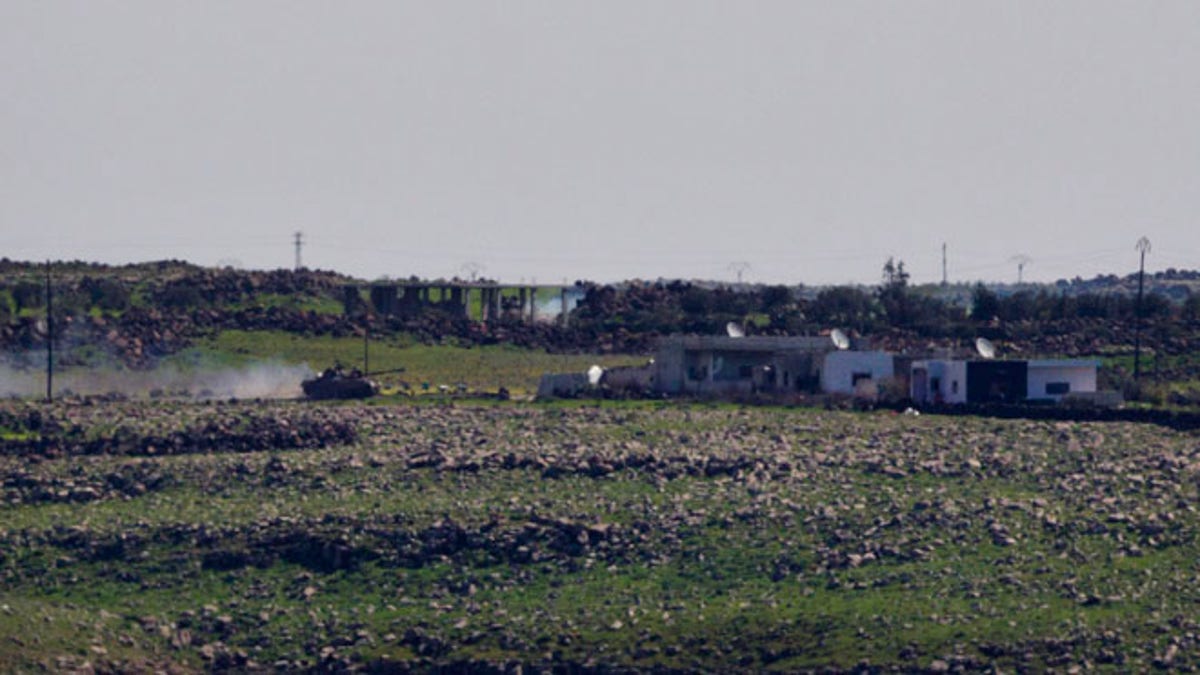
March 7, 2013: A Syrian Army tank moves towards the Syrian village of Jamlah in the southern province of Daraa, Syria, as seen from the Israeli-controlled Golan Heights. Clashes between Syrian troops and rebel fighters flared on Thursday near an area where armed fighters linked to the opposition abducted 21 U.N. peacekeepers a day earlier. The peacekeepers are part of a force that monitors a cease-fire between Israeli and Syrian troops in the Golan Heights. Israel captured part of the territory in the 1967 Mideast war, and while the area has been peaceful for decades, Israeli officials have grown increasingly jittery as the Syrian civil war moves closer to its borders. (AP)
BEIRUT – Syrian rebels captured one village and parts of others on the edge of the Golan Heights Thursday as fighting closed in on the strategic plateau that Israel captured from Syria in 1967 and later annexed, activists and officials said.
The battles near the town of Quneitra in southwest Syria sent many residents fleeing, including dozens who crossed into neighboring Lebanon. The fighting in the sensitive area began Wednesday near the cease-fire line between Syrian and Israeli troops.
One of the worst-case scenarios for Syria's 2-year-old civil war is that it could draw in neighboring countries such as Israel or Lebanon.
There have already been clashes with Turkey, Syria's neighbor to the north. And Israel recently bombed targets inside Syria said to include a weapons convoy headed for Hezbollah in Lebanon, a key ally of the regime in Damascus and an arch foe of the Jewish state.
If the rebels take over the Quneitra region, it will bring radical Islamic militants to a front-line with Israeli troops. Syrian rebels are made of dozens of groups including the powerful, al-Qaida-linked Jabhat al-Nusra, which the Obama administration labels a terrorist organization.
Israel has said its policy is not to get involved in the Syrian civil war, but it has retaliated for sporadic Syrian fire that spilled over into Israeli communities on the Golan Heights.
The Golan front has been mostly quiet since 1974, a year after Syria and Israel fought a war.
The Britain-based activist group Syrian Observatory for Human Rights said rebels seized control of parts of villages a few kilometers (miles) from the cease-fire line with Israel after fierce fighting with regime forces.
The Local Coordination Committees, another anti-regime activist group, reported heavy fighting in the nearby village of Sahm al-Golan and said rebels are attacking an army post.
The Observatory said seven people, including three children, were killed Wednesday by government shelling of villages in the area.
An estimated 70,000 people have been killed in the past two years of conflict in Syria, according to the United Nations.
Rami Abdul-Rahman, who heads the Observatory, said the fighting around the town of Arnabeh intensified Thursday, a day after rebels captured it. He added that the rebels captured two nearby army posts.
In Lebanon, security officials said 150 people, mostly women and children, walked for six hours in rugged mountains covered with snow to reach safety in the Lebanese border town of Chebaa.
The officials, who spoke on condition of anonymity because they were not authorized to speak to the media, said the Syrians fled from the town of Beit Jan, near the Golan Heights.
The Yarmouk Martyrs Brigade, a rebel group active in southern Syria, said in a statement on its Facebook page that its fighters stormed an army post between the villages of Sahm al-Golan and Shajara.
Activists on Facebook pages affiliated with rebels in Quneitra announced the start of the operation to "break the siege on Quneitra and Damascus' western suburbs."
The fighting moved closer to Israel as President Barack Obama was visiting the country for the first time since taking office more than four years ago.
In a new sign of distress for Syria's war-battered economy, the currency hit its lowest point since the uprising against President Bashar Assad began in March 2011. It fell Wednesday to 118 pounds to the dollar compared to 47 before the crisis began.
In the capital of Damascus, exchange shops were paying 108 pounds to the dollar on Thursday, compared to 118 on Wednesday.
The fall of the pound came after members of the opposition Syrian National Coalition elected Ghassan Hitto on Tuesday to head an interim administration they hope will provide an alternative to Assad's regime and help coordinate the fight against his forces.
Also Thursday, state-run TV in Damascus said authorities have handed over to Beirut a Lebanese fighter captured inside Syria in an ambush by government troops.
Hassane Serour had been in held in Syria since Nov. 30, when a group of Lebanese fighters were ambushed by Syrian troops shortly after crossing the border to join the rebels.
Lebanese officials said at the time that 17 gunmen were killed in the ambush.
Lebanon is sharply split along sectarian lines, and Syria's civil war has exacerbated those divisions among supporters and opponents of Assad.
The divisions are a legacy of the nearly three decades when Damascus all but ruled Lebanon until withdrawing troops in 2005.
